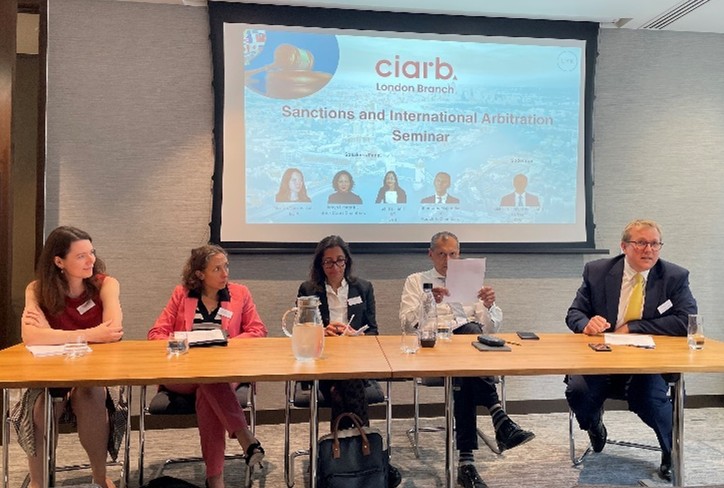By Mikhail Vishnyakov and Leonore Carron-Desrosiers
The past few months brought notable sanctions developments, including:
- The publication of official UK sanctions guidance for non-UK businesses.
- The consideration by the English Court of the effect of EU sanctions on English law contracts.
- Asset freezes on major Russian oil companies (Lukoil and Rosneft).
- New OFSI Legal Services General License.
- OFSI Annual Sanctions Review 2024-2025.
Finally, we have hosted a panel of leading KCs and Marina Tarnovskaia (managing counsel at LCIA) as part of a CIArb event on ‘Sanctions and Arbitration’.
If any of the topics are of interest, please do not hesitate to reach out.
- The publication of official UK sanctions guidance for non-UK businesses
The FCDO published guidance on 27 June 2025 (updated on 8 September 2025) to help businesses outside the UK avoid circumvention of UK sanctions. The guidance aims to help businesses in third countries become aware of the risks of dealing with sanctioned persons or exporting sanctioned goods to Russia, including the risks of losing access to services and goods provided by the UK and other international banks and suppliers, and having UK sanctions imposed on them. The guidance illustrates the UK’s growing interest in monitoring sanctions compliance by non-UK persons.
Non-UK businesses should consider this guidance in detail, available here: UK sanctions guidance for non-UK businesses – GOV.UK
- The consideration by the English Court of the effect of EU sanctions on English law contracts
On 31 July 2025, the High Court rejected a claim by Eurochem against several EU banks who relied on EU sanctions in rejecting Eurochem’s demands under English law governed bonds. In addition to finding that, on the facts, Eurochem continues to be owned or controlled by a sanctioned person (Mr Melnichenko), the English Court agreed that the banks were excused from paying under the bonds under the ‘Ralli Brothers’ doctrine, pursuant to which illegality under foreign law may (in certain circumstances) excuse performance of an English law governed contract. Moreover, the English Court appears to have accepted that compliance with EU sanctions (at least insofar as they concern the restrictions at issue in this case) may also be a matter of UK public policy.
The judgment may be found here: LLC Eurochem North-West-2 & Anor v Societe Generale SA & Ors [2025] EWHC 1938 (Comm) (31 July 2025)
- Asset freezes on major Russian oil companies (Lukoil and Rosneft)
On 15 October 2025, the FCDO announced 90 new sanctions targeting Russia’s two largest oil companies, Rosneft and Lukoil. Future performance of existing contracts with these entities will therefore require careful sanctions consideration. On 22 October 2025, the UK issued General License INT/2025/7598960, permitting transactions with two German subsidiaries of Rosneft.
- New OFSI Legal Service General License
On 22 October 2025, OFSI issued the new general license for legal services INT/2025/7323088, which now allows UK law firms, legal advisers and counsel to receive payments from people and entities sanctioned under 26 sanctions regimes without a specific license. The new general license takes effect on 28 October 2025.
OFSI General License INT/2025/7323008 can be found here: INT.2025.7323088_GL.pdf
- OFSI Annual Sanctions Review 2024-25
On 15 October 2025, OFSI published its ‘Annual Review 2024-25: Effective Sanctions’. The review reports that over £37bn of assets were reported to OFSI as frozen, with £28.7bn worth of assets frozen as a result of the UK’s sanctions on Russia.
The review also reports OFSI’s intention to take an increasingly targeted and proactive approach to enforcement with, as of April 2025, 240 active cases, and a growing proportion identified through non-self-reported sources (151 in 2024-25, up from 108). Noteworthy examples include the £465k penalty against Herbert Smith Freehills Moscow in March 2025, the £5k penalty on Svarog Shipping & Trading Company Limited in May 2025 for an information offence, and the £300,000 penalty against Markom Management Limited for breaching financial sanctions against Russia.
In 2024-25, OFSI prioritised clear, sector-specific guidance by completing its series of Threat Assessment Reports, which cover legal services, high-value dealers and art market participants, property, and cryptoassets. These were addressed in our April 2025 Sanctions Synopsis, available here: Sanctions Synopsis: April 2025 Edition | Cooke, Young & Keidan
Another noteworthy development is that, in June 2025, HM Treasury became a prescribed person under the Public Interest Disclosure (Prescribed Persons) (Amendment) Order 2025, enabling confidential reporting of suspected breaches, including whistleblowing. This means that whistleblowers who disclose information about financial sanctions breaches to OFSI will qualify for employment protections.
OFSI’s Annual Sanctions Review 2024-25 is available here: OFSI_Annual_Review_2024-25.pdf
- Chartered Institute of Arbitrators hosts ‘Sanctions and Arbitration’ panel at Cooke, Young and Keidan LLP
On 10 July 2025, the London Branch of the Chartered Institute of Arbitrators (“Ciarb”) hosted a panel of Saima Hanif KC, Shantanu Majumdar KC, Maya Lester KC and Marina Tarnovskaia (managing counsel at LCIA) focusing on sanctions and arbitration. The seminar was held at Cooke, Young & Keidan LLP and moderated by Mikhail Vishnyakov.




 LinkedIn
LinkedIn Twitter
Twitter Email
Email Print
Print
